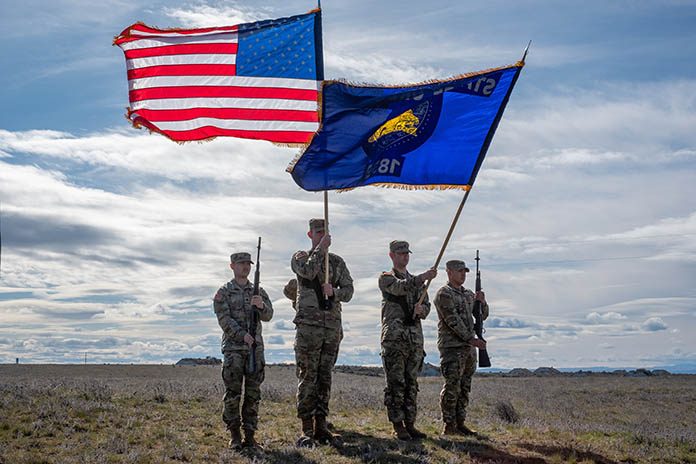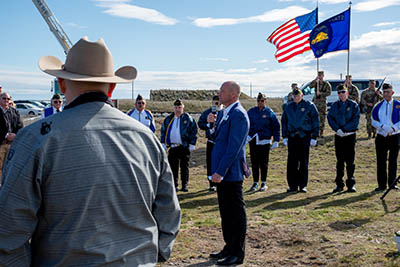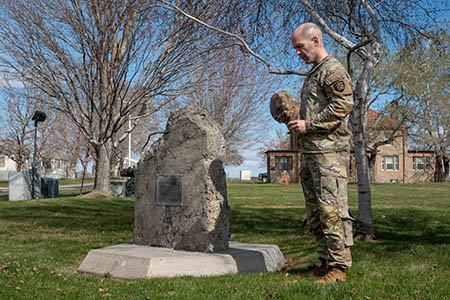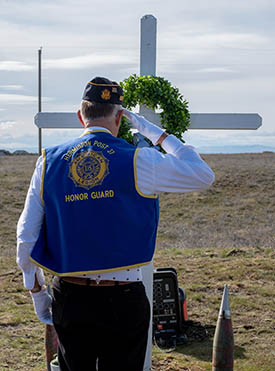
Eighty years ago today at 9:21 p.m. an explosion inside an igloo at the Umatilla Army Ordnance Depot outside of Hermiston instantly killed the six civilian workers.
They were loading a 500-pound bomb in the igloo which already held 264 bombs. The explosion broke windows 20 miles away and could be heard as far as 30 miles away.

Those killed were Harry D. Sever, Hiram Cook, Kenneth L. Fraser, Lance A. Stultz, William R. Sanders and Alice M. Wolgamott – all between the ages of 20 and 40.
It was the only fatal accident at the depot and this morning, at the site of the tragedy, a solemn ceremony was held honoring those lost on that day, March 21, 1944.
State Rep. Greg Smith, representing the Columbia Development Authority which now owns the property, paid tribute to the six people who made the ultimate sacrifice.
“Today, the Columbia Development Authority is preserving this site as a memorial in honor of those who lost their lives,” Smith said.
Following a Tribal prayer offered by Raymond Huesties of the Confederated Tribes of the Umatilla Indian Reservation, two members of the Oregon National Guard presented the colors, and a wreath was laid on a cross that marks the spot of the explosion, which today is a large crater left in the ground.

The Umatilla Army Ordnance Depot was opened on Oct. 14, 1941, when the depot was officially designated a military reservation. At its peak employment during World War II, the depot employed 2,000 workers. The depot continued to store munitions during the Korean War. In 1962, the installation’s name was changed to the Umatilla Army Depot, and it began receiving and storing chemical weapons, which continued to arrive until 1969. In 1996, the depot’s name was again changed, this time to the Umatilla Chemical Depot, and approximately 12 percent of the nation’s chemical munitions were stored there.
In 2001, the Umatilla Chemical Agent Disposal Facility was completed and began incinerating the chemical stockpile, completing the job in 2011 and the depot closed in 2012.

Following the ceremony at the explosion site on Thursday, the proceedings moved on to the base for a moment of silence at the spot where a piece of the exploded igloo landed more than half a mile from the incident.
Umatilla County Commissioner John Shafer, who is also on the CDA board, noted that the deadly explosion took place while the U.S. was fighting World War II.
“I can only imagine the fear of people when they heard the explosion,” he said. Had the war reached Oregon?
Shafer said a kiosk will be built on the explosion site to commemorate the tragedy.
State Sen. Bill Hansell gave a brief history of life at the depot, where his father and uncle had a hog farm which grew to be what Hansell called “the largest hog farm in the U.S.”
By that time, the depot land had evolved into its own little town with a school, a shopping center and a gas station.
Hansell said he often thought about the families of those lost on March 21, 1944.
“Can you imagine if you had a loved one working the swing shift that evening and the concern you would have wondering if they would walk through the door,” Hansell said, adding that the tragedy demonstrated that sacrifices were not only made on the battlefield.
“It’s fitting that we pause and remember their sacrifices,” Hansell said.








